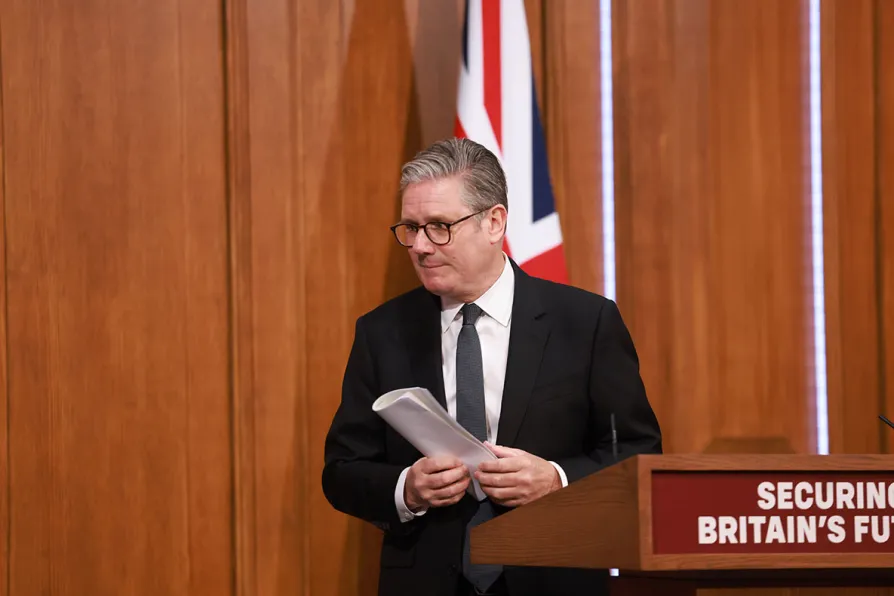John Wojcik pays tribute to a black US activist who spent six decades at the forefront of struggles for voting rights, economic justice and peace – reshaping US politics and inspiring movements worldwide
ALAN SIMPSON warns that Starmer’s triangulation strategy will fail just as New Labour’s did, with each rightward move by Labour pushing Tories further right

 Prime Minister Keir Starmer leaves the end of a press conference on the Immigration White Paper in the Downing Street Briefing Room in London, May 12, 2025
Prime Minister Keir Starmer leaves the end of a press conference on the Immigration White Paper in the Downing Street Briefing Room in London, May 12, 2025
THERE’S ALWAYS a price to be paid for failing to learn the lessons of history. For today’s Labour government, the danger lies in repeating the follies that went into New Labour’s last obsession with “triangulation.”
When first floated by Peter Mandelson, the crude argument was that New Labour no longer needed to obsess about its “core vote.” These were voters who had nowhere else to go. Instead, New Labour set out to woo Worcester Woman and Mondeo Man. They were the fickle voters whose support was predicted to determine the outcome of future elections.
At the time, many MPs (not only on the left) doubted such a simplistic analysis. The argument of the “modernisers,” however, was that all Labour had to do was position itself marginally to the left of the Tories, and the votes of the middle would pour over to us. A “forever government” would be New Labour’s for the taking.
Even when this crashed the Labour Party in Scotland, Westminster seemed oblivious to the implications for everyone else. They argued there was no SNP equivalent south of the border for core voters to defect to.
What Labour’s modernisers chose to ignore was that every time New Labour tucked in just to the left of the Tories, the Tories moved a bit further to the right. It was a process that would see the political deckchairs inching their way across to the right. This is where we have ended up.
Tony Benn always argued it was wrong to grace the far right with an ideological status of its own. Such parties only exist within a political space abandoned by the left. If you want to challenge the right, then move the deckchairs in the opposite direction.
Mandelson was indifferent to this argument. So too, it seems, are his heirs and successors in today’s Labour administration. After years of austerity-driven politics, Reform came to realise they could pitch for support both from disgruntled Tory voters (who were not the beneficiaries of wealth transfers to the corporately rich) and from traditional Labour voters, who hadn’t been the beneficiaries of anything at all. Chase this and you end up knee-deep in the politics of recrimination rather than redistribution.
An island of strangers?
There has been a huge backlash against Keir Starmer’s use of racially pejorative images in describing the immigration reforms he claims Britain needs. The language is visceral, not analytical.
Are we “strangers?” Maybe. But don’t blame this on immigrants. Look first at the “why” behind the insecurity.
We bemoan the disconnection between generations, without mentioning the disappearance of apprenticeships that served as accompanied pathways into adulthood. We complain that the kids don’t even socialise with each other, but ignore the decimation of youth services and the collapse of funding for after-school activities. We say that families don’t talk to each other, when cafes and restaurants are often full of people like us, focused more on our smartphones than on each other.
None of this is the fault of refugees or immigrants. Corporate capitalism just became adept at dividing us from one another.
Profit-harvesting justified the centralisation (and automation) of services. Banks closed local branches. Big stores did the same, and small stores followed. Estates, villages and small towns were pushed closer to ghost town status. None of this was down to refugees.
If we are not careful, the next phase of techno-capitalism will accelerate this trend and race us towards fascism. If this isn’t the future Labour is looking for, then dumping triangulation has to be its starting point … quickly followed by a hug.
The big hug of multiculturalism
It wasn’t long ago that we were clapping healthcare staff who kept us alive through the Covid pandemic. Large numbers of these were immigrants. Many didn’t make it through the pandemic themselves. But all deserve hugs (or posthumous hugs) of “thank you.” It was the love and dedication of strangers that kept the rest of us alive.
The same is true of today’s care workers. Before you slam the door on overseas recruitment, face the fact that there are 130,000 unfilled vacancies in England’s care sector. It is chronically under-funded, under-paid and under-trained. Nevertheless, Britain issued less than 10,000 care-worker visas last year. But it didn’t stop privatised providers making bumper profits.
What Starmer ought to have said was that his government would boost care-sector pay, turn it back into a pre-Thatcherite, not-for-profit, public service, and introduce generous grants for an upgraded care-training programme.
If Britain wants to pay homage to its war veterans, forget your ceremonial march-pasts; recruit care workers — from home and abroad — to staff the care services in today’s “home front.”
Dennis Skinner famously celebrated his own “UN” heart pacemaker in a Commons debate, listing the different nationalities of NHS staff who combined to deliver his medical care. These were the “strangers in the night” who kept him alive. These “strangers” also keep the British economy alive.
It shouldn’t have depended on Sadiq Khan, Labour’s mayor of London, to redefine migrant workers as contributors, not spongers. But he did.
Khan’s point — that the average family of a skilled migrant worker contributes £12,000 a year to the British economy, while the same skilled-worker families of British citizens take out £4,400 more than they put in — is the one Keir Starmer should have been making. Perhaps it’s just hard to do so when dancing to Reform’s tune.
Joining the dots
Few now look for radicalism in government policymaking, but it can’t be unreasonable to look for rationality and joined-up thinking.
Overseas students should never have been included in the immigration count. Cutting back their numbers has plunged the university sector into financial crisis. Courses are being cut, tutors laid off and fees increased in desperate attempts to balance the books. The net effect will be to make universities less accessible and less affordable for our own kids. Not the smartest of moves, and not the fault of immigrants.
If the objections move on to the impact students have on housing, then rethink the housing programme (and do so for asylum-seekers while you are at it). Britain hasn’t been building enough social housing for decades. We need a climate bank (like Germany’s KfW Bank) offering near-zero interest capital finance for public-sector housing programmes. Make net-zero energy standards a precondition of the finance, and you have something that works both for the public and the planet.
This is where you bolt in the “asylum” issue, too. The far right rails against the cost of accommodating refugees. What never gets mentioned is that none of this money goes to refugees themselves. Most goes into the pockets of private landlords.
It is the rentier class, not the refugee, who walks off with the public’s money. My take is that public money should go into public assets. Give local authorities the budgets to build (and compulsorily purchase) land assets to meet both today’s and tomorrow’s housing needs. Do so and you strengthen local resilience, local regeneration and social inclusion. It’s what Labour always used to stand for.
The government doesn’t have to embrace the radical or visionary to get itself out of this mess. It just has to be rational … and inclusive. Neither of these will be found in triangulating with Reform. There are dozens of better options. But Nigel Farage figures in none of them.
Labour will not win back the support of disillusioned “core” voters by becoming Reform-lite. There was a different warning message in the recent local elections: “Beware the tail that wags the dog.”
The haemorrhage of seats Labour lost made it clear that voters were more inclined to have the dog put down than to take it home and feed it.
Don’t say we weren’t warned.
Alan Simpson is a former Labour member of Parliament (1992-2010) for Nottingham South.

MATT WRACK issues a clarion call for a rejuvenation of public services for the sake of our communities and our young people

DIANE ABBOTT MP warns Starmer’s newly declared war on foreigners and scroungers won’t fix housing or services — only class struggle against austerity can do that, and defeat Farage in the process

It’s where she was looked after and loved by workers who don’t deserve Starmer’s ugly condemnation, writes LINDA PENTZ GUNTER

Reform’s rise speaks to a deep crisis in Establishment parties – but relies on appealing to social and economic grievances the left should make its own, argues NICK WRIGHT










